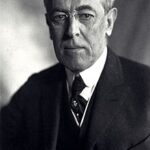President Woodrow Wilson signed the Espionage and Sedition Acts during World War I. These laws fundamentally changed American civil liberties during wartime. The acts criminalized speech critical of the war effort or government.
The Legislative Framework
The Espionage Act passed in June 1917 with broad congressional support. It prohibited interference with military operations and recruitment. The law made it illegal to support America’s enemies during wartime. Wilson argued these measures were necessary for national security. ⚠️ Critics immediately warned about constitutional violations and free speech suppression.
Expanding Government Power
The Sedition Act of 1918 expanded federal authority over public discourse. It criminalized “disloyal” language about the government, military, or flag. Citizens could face prison for criticizing Wilson’s administration. The law targeted newspapers, speakers, and political opponents. 📊 Federal prosecutors filed cases against nearly 2,000 Americans under these acts.
Targeting Dissent
The acts specifically targeted socialists, pacifists, and recent immigrants. Eugene Debs received a ten-year prison sentence for an anti-war speech. German-Americans faced particular scrutiny and harassment. Labor leaders and union organizers became frequent targets. 💰 Many families lost income when breadwinners faced prosecution and imprisonment.
Impact:
The Espionage and Sedition Acts created lasting damage to American democratic institutions. These laws established dangerous precedents for government censorship during crises. The Supreme Court initially upheld most prosecutions under these acts.
Constitutional Damage
🔥 The acts severely weakened First Amendment protections for decades. Courts developed restrictive interpretations of free speech rights. The “clear and present danger” test emerged from these cases. Many legal scholars consider this era the nadir of civil liberties. The acts demonstrated how quickly constitutional rights could disappear during wartime.
Social and Political Consequences
📉 Public trust in government institutions declined significantly among targeted communities. Socialist Party membership plummeted due to prosecutions and intimidation. German-American communities faced systematic persecution and cultural suppression. Labor unions lost key leaders to imprisonment and legal harassment. The acts created a chilling effect on political dissent that lasted beyond the war.
Long-term Legacy
The Espionage and Sedition Acts influenced later wartime legislation and policies. Similar restrictions appeared during World War II and the Cold War. 🌍 International observers criticized America’s commitment to democratic values. The acts became cautionary examples in civil liberties education. Modern free speech doctrine still references cases from this period. Legal scholars use these acts to illustrate the fragility of constitutional protections during national emergencies.
